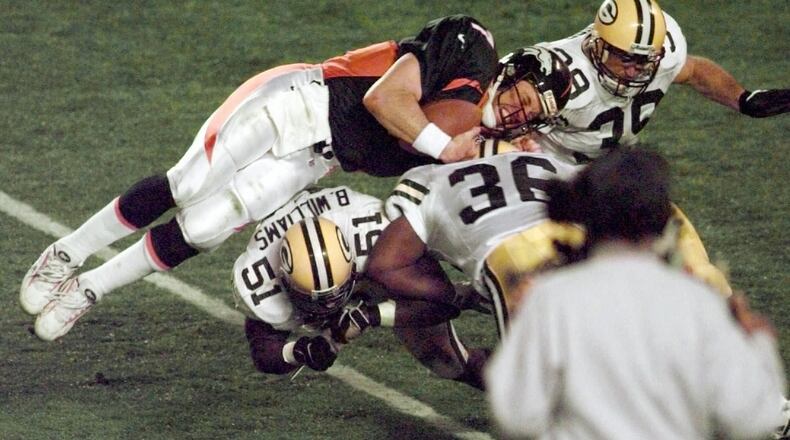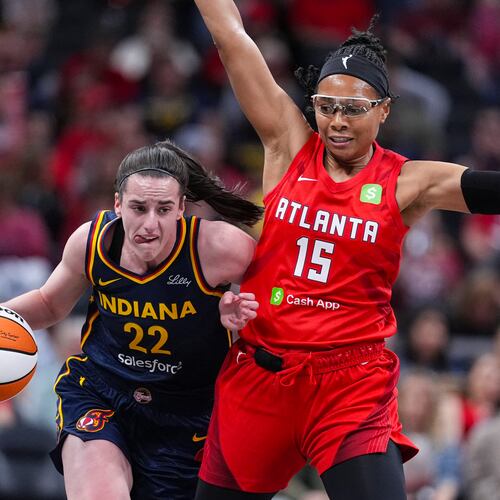Among the thousands of images left behind by America’s biggest sporting event, a few live on as indelible. During this week leading up to Super Bowl LIII in Atlanta, we look back daily on a select precious moment and appreciate the story behind it. Second in a seven-part series.
John Elway had pretty much stunk on ice in the Super Bowl.
His first three trips, the Denver quarterback with the toothy smile of a ruminant and the competitive thirst of a carnivore had only discovered progressively worse ways to fail. Each of three straight losses in the big game from 1987 through 1989 were more lopsided the last (19-, 32- and 45-point margins). Each stat line next to his name was more damning than the one before (combined his was 46 of 101 passing, 45 percent complete, for 669 yards, two touchdowns and six interceptions).
The frustration that attended those losses had years to build before Elway would get back again to the Super Bowl – No. XXXII on Jan. 25, 1998. He was like a liter of soda that had been stored in a working paint shaker.
And then come the moment when you unscrew the top, stand back, because all that agitation is bound to spew out. For Elway the eruption came late in the third quarter in San Diego, the Broncos third-and-six on the Green Bay 12, game tied at 17.
More on the series
» 1967 Super Bowl: A cigarette and a Fresca
» 2008 Super Bowl: The helmet catch
» 1973 Super Bowl: Who stole my watch?
» 1969 Super Bowl: The poolside guarantee
As the option to pass the ball broke down, Elway reverted to another that had always served him well – flee. Even at 37, in his 15th season of NFL-approved punishment, he didn’t object to running the ball. And as Elway broke away in the middle of the field, a first down right there within reach but also with Green Bay defenders closing in all around him, he had a decision to make.
To slide. To go down and risk the variables of a good spot and a favorable measurement and the possibility of coming up just short of a first down.
Or to instinctually declare, “Ah, the hell with it,” and remove all doubt.
This is where it all came out – the years of losing Super Bowls and the uncompromising determination to change the narrative of his career. The most effective throw Elway made that day was throwing himself into the air on a third-down scramble, come what may. As he did so, he was first hit by safety LeRoy Butler and then fellow defensive back Mike Prior, causing the oldest guy on the field at the moment to spin in the air like a helicopter blade.
Rather than being broken by the crash, Elway was inspired, leaping to his feet to celebrate the certain first down.
“As soon as I saw John do that, I knew the game was ours,” Broncos running back Terrell Davis said at the time. The former Georgia Bulldog – the game’s MVP with 157 rushing yards – scored a go-ahead touchdown two plays later. And the Broncos held on to beat Green Bay 31-24.
Afterward, Elway didn’t try to disguise the theme of one game completing a career.
“It feels two times better than anything I could have imagined,” he told the world post-game. “I have wiped the slate clean.”
“There have been a lot of things that go along with losing three Super Bowls and playing for 14 years and being labeled as a guy who has never been on a winning Super Bowl team,” he said. “To finally come out and show them … it's unbelievable. This was the ultimate win.”
Broncos owner Pat Bowlen was no less emphatic when he declared at the trophy ceremony, “There’s one thing I want to say: This one’s for John.”
Here was a moment that spoke louder than numbers, for Elway’s were pedestrian: 12-for-22, 123 yards and an interception. Davis was the power train of this offense this day.
But the quarterback would have one more Super Bowl in him, saving his personal best outing – a game MVP outing – for the final game of his career. The following year in Miami, he threw for 336 yards, a touchdown and an interception and compiled by far the highest quarterback rating of his five Super Bowl appearances (99.2).
Against, of course, Atlanta’s Falcons.
About the Author
Keep Reading
The Latest
Featured



